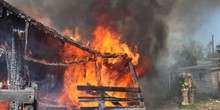As Thanksgiving approaches and winter weather arrives, horse owners have much to be thankful for. Whether you live on a big horse ranch with acres of pastures and multiple barns or are the owner of a single horse with a small barn and paddock, cold weather increases the danger of horse barn and stable fires because of the use of heaters, defective electrical wiring and appliances, and storage of hay and bedding material.

Preventing horse barn and stable fires
Thanksgiving time serves as a reminder to think about our barns and stables as the 'Homes of our horses' and practice important fire prevention tips for our horses just as we do for our human family.
The Equine List Management Group in Lexington, Kentucky has put together a Barn Fire Safety Checklist that cites the occurrence of many barn and stable fires and lists the most common causes of fires that take the lives of horses and destroy valuable property.
As you read down the following list, recognize the number of common causes for a barn and stable fire, most of which you can eliminate or reduce the risk if you had been warned in advance. We must remember, the barn and stable are not a house where we take so many things for granted when it comes to fire prevention.
This is the time to think about the barn and stable as a "home" and practice these tips for our horses just as we do for our human family.
Note: These common causes of fires are not ranked in order of importance.
The Most Common Causes of Barn and Stable Fires
- Spontaneous composition of improperly cured hay and forage type bedding
- Lightning strikes to buildings
- Careless smoking in barns and stables
- Overheating of plumbing related heater devices to prevent frozen pipes
- Overheating of electric supplemental portable heater appliances during winter
- Faulty electrical wiring and circuit boxes
- Defective electrical appliances [i.e. coffee pots, microwave ovens, toasters, etc]
- Overheating of electrical or gas hot water heating elements
- Defective electric fence chargers
- Defective and/or excessively dusty electric fan motors
- Sparks from machinery operating in areas close to barns and stables.
- Sparks from a forge being operated in and near barns and stables.
- Overheating of portable lighting and heat lamps
- Careless burning of waste materials and rubbish
- Overloaded, improper use of extension cords
- Presence of accelerants [i.e. aerosols, gas, kerosene, diesel, propane, etc]
- Arson
November is a good time to check out your horse facility whether large or small. Perhaps it should become an annual safety checkup time before sitting down to Thanksgiving dinner to make sure that on the coldest nights, your horses are safe from the threat of an unexpected barn or stable fire.
Note: Happy Thanksgiving from the EquiMed Family to Your Family: We are so thankful for this season and the joy it brings, and so thankful for people like you who care for horses and all animals, making our world a better and kinder place.
